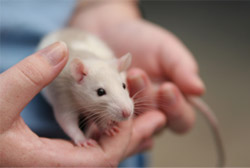Caring for pet rats and mice
 Rats and mice can make great pets and can be lots of fun, if safely handled. They require plenty of attention to be cared for properly and can live up to five years.
Rats and mice can make great pets and can be lots of fun, if safely handled. They require plenty of attention to be cared for properly and can live up to five years.
Legislation
The welfare of all animals, including rats and mice is protected by the Prevention of Cruelty to Animals Act 1986.
Housing for your rats and mice
Rats and mice require a hutch to live in that is safe from predators such as dogs and cats. It needs an area that protects them from the weather and provides enough space for exercise. A suitable hutch design is waterproof and includes a dark, dry area for the rats or mice to rest and hide as well as bedding of soft hay or shredded newspaper. The other section of the hutch should have access to light and be fitted with ropes, ramps or ladders for environmental stimulation and space for exercise and exploration.
The floor of the hutch should be covered in at least 2 to 3cm of litter (wood shavings or shredded paper). It must also have good ventilation but be free of draft.
It is important to clean the hutch regularly by removing soiled bedding and ensuring the rats and mice have a dry area to sleep. Rats and mice that do not have access to clean bedding can suffer from:
- respiratory infections
- skin ailments
- pest infestation such as fleas and mites.
Heat stress
Rats and mice can easily suffer from heat stress. Once the temperature rises above 30°C you must regularly monitor your rats or mice. Do not to place the hutch in direct sunlight. Keep it in the shade, even on warm to cool days. It doesn't take long for heat to build up in small areas. On hot days you can provide a frozen ice brick or drink bottle in the nesting area of the hutch to reduce the temperature.
Feeding your rats and mice
Rats and mice are omnivores and will eat most foods. They can be fed pellets that are available from pet shops. Grass hay should be made available regularly. Fresh green vegetables should be included in their daily diet. You can feed them:
- cabbage
- lettuce
- carrots
- broccoli
- apple
- celery.
Fresh, cool water must be provided at all times, either in a drip feeder or a shallow bowl.
Health problems
Rats and mice have poor recuperative powers so it is vital that you keep your pet is as healthy as possible to minimise illness.
Get advice from your local vet for any health issues that your rats or mice develop.
Handling your rats or mice
Rats and mice can be good pets for children if they are treated appropriately and socialised. They must be handled regularly to develop a positive relationship with humans. Pick up your rats and mice gently to make sure they feel secure and safe. If rats and mice are not accustomed to being handled or are mishandled they can bite. Wear gloves if you are not sure whether your mice or rats are tame enough to handle.
Companionship
Rats and mice are social creatures and prefer to live in pairs or groups. They should be housed with their own species. Avoid housing rats and mice together.
To avoid unwanted pregnancies separate males and females. Males will be less likely to fight each other if introduced at a young age.